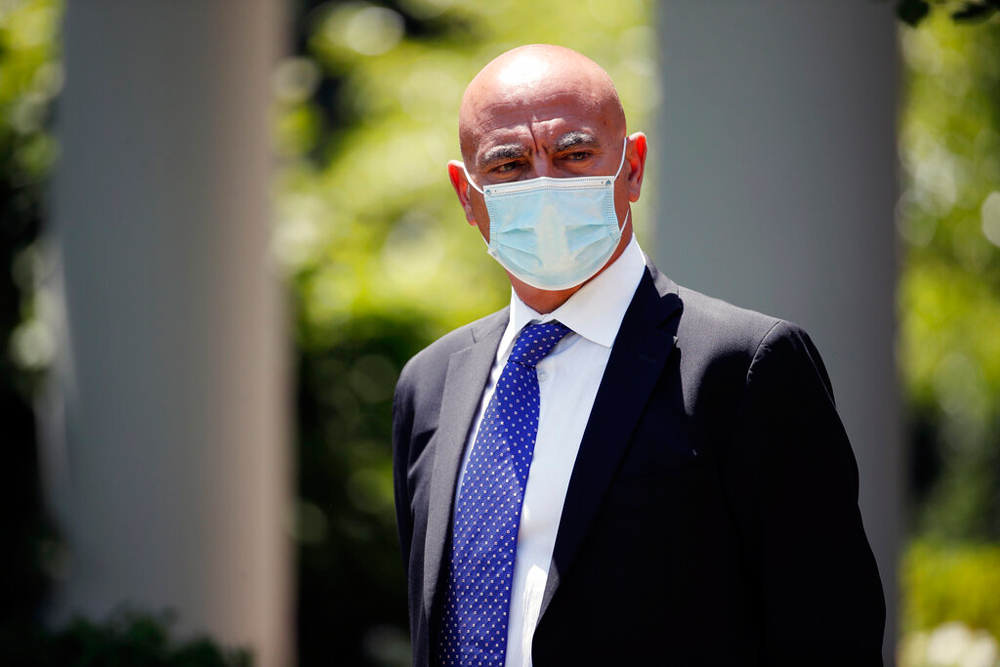The chief scientist brought on to lead the Trump administration’s vaccine efforts has spent the last several days trying to disentangle pieces of his stock portfolio and his intricate ties to big pharmaceutical interests, as critics point to the potential for significant conflicts of interest.
The scientist, Moncef Slaoui, is a venture capitalist and a former longtime executive at GlaxoSmithKline. Most recently, he sat on the board of Moderna, a Cambridge, Massachusetts, biotechnology firm with a $30 billion valuation that is pursuing a coronavirus vaccine. He resigned when President Trump named him last Thursday to the new post as chief adviser for Operation Warp Speed, the federal drive for coronavirus vaccines and treatments.
Just days into his job, the extent of Dr Slaoui’s financial interests in drug companies has begun to emerge: The value of his stock holdings in Moderna jumped nearly $2.4 million, to $12.4 million when the company released preliminary, partial data from an early phase of its candidate vaccine trial that helped send the markets soaring on Monday.
Dr Slaoui sold his shares on Tuesday, and the administration said he would donate the increased value to cancer research.
But the Moderna stock is just one piece of his pharmaceutical portfolio, much of which is not public. And some ethics and financial securities experts have voiced concerns about the arrangement Dr Slaoui struck with the administration.
In agreeing to accept the position, Dr Slaoui did not come on board as a government employee. Instead, he is on a contract, receiving $1 for his service. That leaves him exempt from federal disclosure rules that would require him to list his outside positions, stock holdings and other potential conflicts. And the contract position is not subject to the same conflict-of-interest laws and regulations that executive branch employees must follow.
Dr Slaoui, an expert in molecular biology and immunology, is not the first Trump administration official with close relationships to drug and health care companies. His immediate boss, Alex M. Azar II, the health and human services secretary, is a former Eli Lilly executive. And the former commissioner of the Food and Drug Administration, Dr Scott Gottlieb, has moved in and out of government twice, and divested of his interests immediately upon assuming the FDA job in 2017.
Dr Slaoui, 60, has spent his career developing vaccines and biotechnology businesses, and he has the investments and board seats to prove it.
He still holds just under $10 million in GlaxoSmithKline stock and remains a partner in Medicxi, a venture capital firm that specialises in investing in biotech concerns, with several companies engaged in the global race to develop treatments or vaccines to stanch the coronavirus pandemic. GSK and Sanofi have become partners in creating a vaccine candidate against the coronavirus.
The administration has reviewed Dr Slaoui’s affiliations with several companies and concluded in several instances that there were no conflicts because his advisory roles were unrelated to coronavirus research or treatments, and in some cases the corporations had no products against the virus in production, according to a senior official with the department of health and human services.
The new group of which Dr Slaoui is lead scientist will vet candidates for vaccines and treatments, to decide whether they should receive federal financial backing and additional support.
In an interview, Dr Slaoui said he was determined to avoid conflicts and would re-evaluate any remaining associations if his financial interests stood to gain more from his new post overseeing the government’s push to encourage speedy development of treatments or vaccines.
He did not say how much his GSK shares were worth. When he left the company in 2017, he held about 240,000 shares and share equivalents, according to the drug company’s annual report and an analysis by the executive compensation firm Equilar.
He said he told administration officials that he did not want to sell his company stock. “I have worked for 29 years for GSK,” Dr Slaoui said. “I have never sold a single share of any company in my life. This is my retirement. What I said regarding the GSK shares, I said I cannot take the job if I have to sell them.”
Advanced Decision Vectors, which regularly contracts with the National Institutes of Health and other federal agencies, will pay Dr Slaoui’s living expenses when he stays in Washington away from his home in the Philadelphia area.
Without public disclosure, some ethics experts called his contract an end-run around the rules.
“This is basically absurd,” said Virginia Canter, who is chief ethics counsel for Citizens for Responsibility and Ethics in Washington. “It allows for no public scrutiny of his conflicts of interest.”
But others noted the lengths to which Dr Slaoui was already distancing himself. Joseph Grundfest, a Stanford law professor and a former commissioner on the Securities and Exchange Commission, said conflicts of interest involving scientific experts were hardly rare.
New York Times News Service











